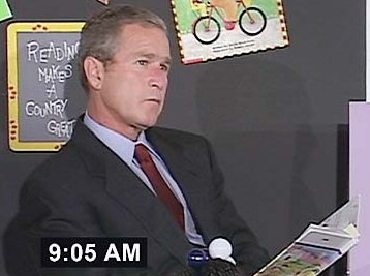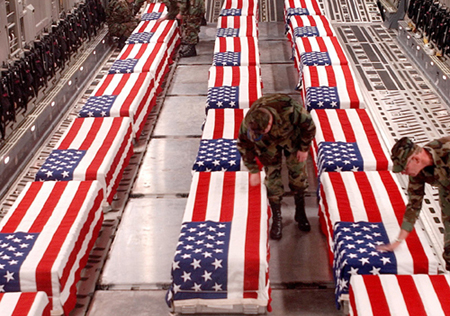See other 4play Articles
Title: Laura Bush: Why We Read
Source:
WSJ
URL Source: http://www.opinionjournal.com/weekend/fivebest/?id=110009022
Published: Oct 1, 2006
Author: Laura Bush
Post Date: 2006-10-01 20:57:14 by Zipporah
Keywords: None
Views: 116
Comments: 13
1. "Hop on Pop" by Dr. Seuss (Random House, 1963). Selecting books with the most personal meaning is very difficult for a librarian--it's like asking which are your favorite children. Among children's books, "Hop on Pop" has a lot of personal meaning for me. It features Dr. Seuss's typically wonderful illustrations and rhymes ("SEE BEE THREE Now we see three"), of course, but the main thing for me is the family memory--the loving memory--that the book evokes of George lying on the floor and reading it to our daughters, Barbara and Jenna. They were little bitty things, and they took "Hop on Pop" literally, and jumped on him--we have the pictures to prove it. 2. The "Little House" Series by Laura Ingalls Wilder (Harper, 1932-43). I loved the Laura Ingalls Wilder books, and I identified with Laura because of her name and her brown hair. But there were other reasons that they were important to me: I read them with my mother, and they gave me a whole sense of our country--the sense of what life was like as a pioneering family traveled across 19th-century America. You followed along as Laura grew up, and then you moved on to the young-adult books of the series, like "These Happy Golden Years," when Laura becomes a teacher and marries her suitor, Almanzo. These books--about a loving and warm family life, about parents who expected the best for each and every one of their children--represent what I view as genuine American values. 3. "The Brothers Karamazov" by Fyodor Dostoyevsky (1880). As I grew up I found "The Brothers Karamazov" to be one of the deepest, most interesting of books I read--one that was the most fun to re-read. Maybe I shouldn't say "fun," given that it is about spiritual struggle, but to read it over and over again at various times in my life was always rewarding. That includes the time I read the book while sitting by a swimming pool in Houston, when I worked as a teacher in the early 1970s. Though the book was Russian, there was always a sort of Texas heat about this memory. Later, when George and I lived in Dallas, I took literature courses at the Dallas Institute, and of course we read "The Brothers Karamazov." But it is such an endless well of ideas on human character that this book is always one I'd be ready to pick up and read again. 4. "Little Women" by Louisa May Alcott (1868). "Little Women," Louisa May Alcott's book about a Civil War family, is one I remember vividly, first from reading with my mother when I was little. She read it to me before I could read. The impression it made just shows how important it is to have parents who read and who read to you. That's how every one of us librarians ended up where we did: making our careers out of reading because we loved it so much. First I was a teacher and then, since what I liked best about teaching was reading and sharing literature with children, I became a librarian. Now it is the whole focus of my life, really. And it all started with my mother's love of reading books like "Little Women" to me. I went on to read it on my own, then with friends and my own children. 5. "The Adventures of Huckleberry Finn" by Mark Twain (1884). "Huckleberry Finn" is another of those books that I value greatly, that I read a number of times. It is a classic American work--with its themes of freedom and independence and Huck's coming of age as he flees on a raft down the Mississippi to avoid "sivilizing" back home--and one that is important to our country. The pleasure to be had from reading a book like "Huckleberry Finn" is one reason why, I believe, there is a renewed interest in reading in this country. There are book clubs all over. I see that my girls and their friends all read, and they love to trade books and talk about books they like. Reading has been such an important part, such an incredible center of my life, that I would like for everyone, especially American students, to know how rewarding it can be. Mrs. Bush is hosting--with James H. Billington, the librarian of Congress--the Library of Congress's National Book Festival in Washington this weekend.
Poster Comment:
Why We Read
The books that inspired me to champion literacy.
BY LAURA BUSH
Saturday, September 30, 2006 12:01 a.m. EDT 

Post Comment Private Reply Ignore Thread
Top • Page Up • Full Thread • Page Down • Bottom/Latest
#1. To: Zipporah (#0)
I'll believe she reads Dr. Suess and Laura Ingalls Wilder, but I do not believe she reads Dostoveksy and Twain.
"Anyone who has the power to make you believe absurdities also has the power to make you commit atrocities." — Voltaire (1694-1778)
Please, please, please tell me that's not a photoshopped picture.
"First I'm gonna bother everybody I meet, and then I'll probably go home and get drunk."
Nope not photoshopped...
Our dream has come true - we have installed a moron in the peoples' house.
"Wasn't "Hop on Pop" written by Mark Foley? :-)
Some how, some way, that's really dirty.
"Wasn't "Hop on Unfreekingbelievable. I'd seen this before and my mind could not accept what I was seeing. The kids must've thought chimp had special reading powers.
#2. To: Zipporah (#0)
#3. To: orangedog (#2)
#4. To: Zipporah. YT. all (#3)

#5. To: Zipporah (#0)
Remember...G-d saved more animals than people on the ark. www.siameserescue.org
#6. To: who knows what evil (#5)
#7. To: who knows what evil (#5)
Pop Pup" written by Mark Foley?

#8. To: Zipporah (#0)

***LEAP***
"I tell you, freedom and human rights in America are doomed. The U.S. Government will lead the American people, and the West in general, into an unbearable hell and choking life.
-- Osama bin Laden
"A prohibition law strikes at the very principles upon which our govt was founded."
- Lincoln
All our liberties are due to men who, when their conscience has compelled them, have broken the laws of the land.
--William K Clifford
#9. To: IndieTX (#8)
hes really sincere isnt he?? Impressive .. geesh.. sickening.
#10. To: Zipporah (#0)
Today on NOW, they had a picture of the 60 books Smirky the Giggling Murderer claims he read this summer. Look, I read a lot. There is no way I read 60 books in three months, and the idea that this moron did is absolutely laughable. But they say this shit with a straight face, and a good chunk of America just laps it up. So now if you call him a moron, some moron will say with total conviction that he reads nearly a book a day (if they have those kind of mad math skilz). I hate to add laws to an already clogged legal system, but we really need a new felony. "Madam, you are charged with being a stupid freaking sheep, too dumb to live. How do you plead?" I wish I could get a list of these Bushsuckers' real names and addresses. I'm pretty sure the Nigerian scam would make me a rich man with a list of suckers like that.
#11. To: Zipporah (#0)
Press 1 for English, Press 2 for English, Press 3 for deportation
#12. To: IndieTX (#8)
Very funny. Exact-mungo. "Zowie," the kids thought, "that's how you can get to be President of the most powerful nation on earth - read books upside down and have a dumb look on your face ( to confuse the competition) while you're doing this amazing feat." Shish - what kind of role model we have in the Oval Office - how to win and get to the top without even trying...
Unfreekingbelievable. I'd seen this before and my mind could not accept what I was seeing. The kids must've thought chimp had special reading powers.
#13. To: Uncle Bill (#11)
How appropos to the subject under discussion - yes, sirree, King George doesn't speak often ( his handlers won't let him), but when he does get the opportunity, it's hard to forget ( put out of your mind) what he said. That has to be one of my favorite Bushisms. Of course #1 quote in my books is the "my job is to push the propaganda" quote from Dear Leader. Groan.
"Is our children learning" - George W. Bush
Top • Page Up • Full Thread • Page Down • Bottom/Latest